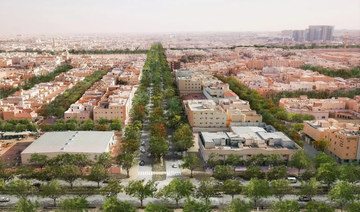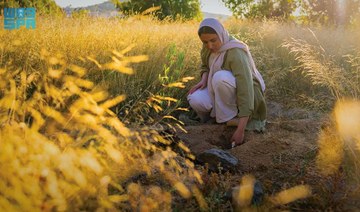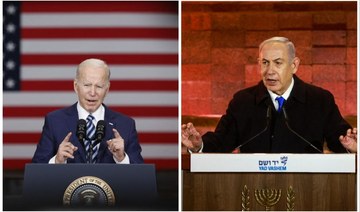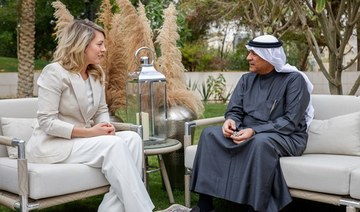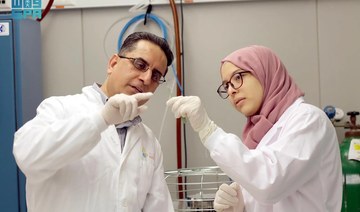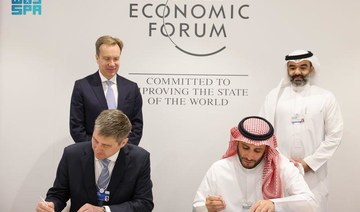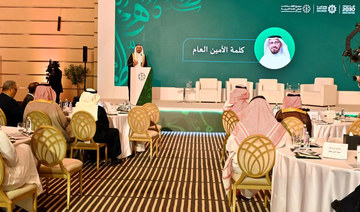JEDDAH: The Saudi Arabian Society for Culture and Arts (SASCA) is launching a training institute to promote culture and arts, in a new initiative to develop performance and technical skills.
The “Institute of Culture and Arts for Training” or "Thaqqif" is aimed at creating an environment conducive to the advancement of culture and arts in the Kingdom.
Omar Saif, chairman of SASCA said “the institute aims to fulfill the Kingdom’s Vision 2030 to support talents in culture and arts, and invest their talents and energies, while creating opportunities and various options in culture and arts field.”
Saif said the aim of establishing the institute is to create an official reference to issue accreditation licenses for training talents in the field of culture and arts in the Kingdom.
The institute seeks to offer courses and programs in fine arts, photography, calligraphy, digital arts and design, as well as programs in art writing, music, theater and folklore arts, filmmaking, and cinema.
The first courses will be launched in November, and will cover all of SASCA's branches, under the supervision of a specialized team in each branch.
SASCA was established in 1973 as a civil society institution to be the first sponsor of all cultural and artistic activities in the Saudi Arabia.
Saudi culture society launches institute for arts and culture training
Saudi culture society launches institute for arts and culture training
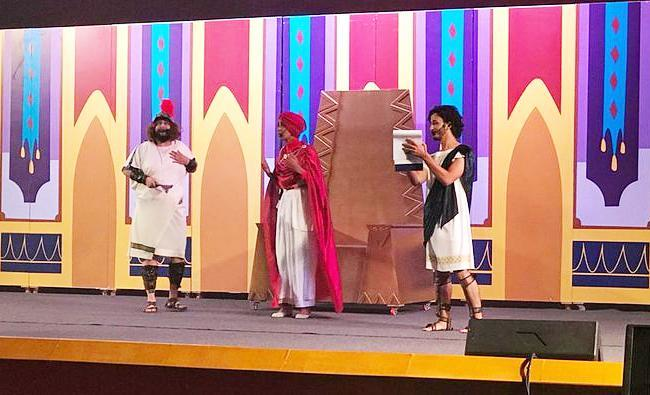
First National Greening Forum held in Riyadh
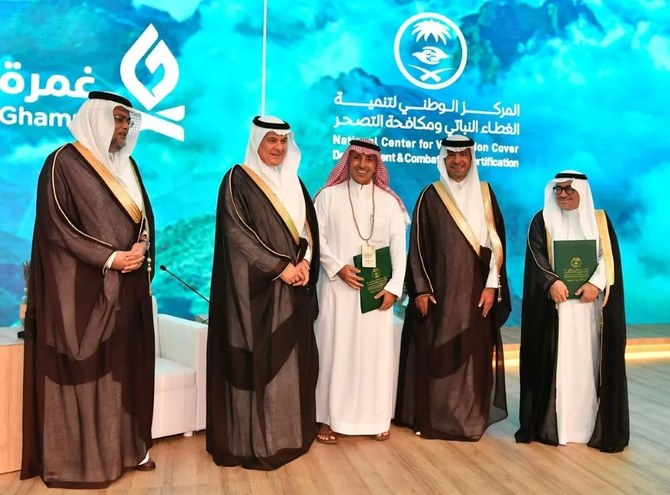
- Experts discussed nature-based solutions to environmental issues, highlighting Kingdom’s nature reserves as prime example
- Forum highlighted the role of public, private and nonprofit sectors in achieving the Saudi Green Initiative target of planting 10 billion trees
RIYADH: As countries around the world push to invest in nature-based solutions to environmental problems, experts in Saudi Arabia came together in Riyadh to discuss the most pressing issues at the inaugural National Greening Forum.
Launched under the patronage of Minister of Environment, Water and Agriculture Abdulrahman Al-Fadhli, the forum was organized by the National Center for Vegetation Cover Development and Combating Desertification and attended by Minister of Municipal, Rural Affairs and Housing Majed Al-Hogail, several other ministers, organisations and specialists from local, regional and international sectors related to the environment.
CEO of the center, Khalid Al-Abdulqader, said in his opening speech that the forum will “unify and consolidate national efforts to enhance vegetation cover and mitigate land degradation.”
Addressing the restoration of green spaces in the Kingdom, he said: “We are committed to restoring natural green spaces using sustainable irrigation methods, planting local tree species, and ensuring their protection and monitoring through advanced technologies.”
In a panel discussion titled “Nature-Based Solutions: Key to Transformation,” industry specialists and experts discussed various issues related to promoting the natural growth of trees and their environmental effect, as well as the industries tied to environmental issues and ways their institutions work to find sustainable solutions for the future.
“Vegetation and afforestation are part of nature, which includes the atmosphere, soil, and organisms. The correlation between all of these is the main element for these solutions. So, organizing and monitoring this relationship is key for sustainability and greening,” said Dr. Ahmed Al-Farhan, board member of the center and a faculty member at King Saud University.
For ages, large plumes of dust and sand sweeping across most of Saudi Arabia were a natural, seasonal occurrence, but this year there has been an unusual and noticeable decrease in sandstorms.
Jamaan Al-Qahtani, executive director of the Regional Center for Dust and Sandstorms, explained: “Sandstorms need two factors to occur: dry, load-bearing soil and winds fast enough to carry it.” A few years ago, he said, there were indications that the Kingdom was experiencing fewer sandstorms.
“This April was a 60 percent drop on the average of the past 20 years. March was 30 percent, and January was more than 60 percent. Last year, Riyadh had a record of only one sandstorm.”
Explaining the reason behind this, he said: “We attribute that firstly to rainfall and the timing of that rainfall. When rain falls during the best time for vegetation, that helps with stabilizing the soil.”
The environmental system also plays a pivotal role in preventing degradation, as well as laws that restrain individuals and other entities from tampering with the environment.
Sand and dust storms affect 11 of the UN’s 17 sustainable development goals. For example, 7 million people in total die from all sources of air pollution and degraded air quality. The Middle East and North Africa region loses $150 billion annually due to weather and climate disasters, Al-Qahtani said.
To meet the growing demand for fresh water in Saudi Arabia, authorities launched a project in 2022 that alters the structure of clouds to increase rainfall; a technique known as cloud seeding.
Ayman Al-Bar, executive director of the Regional Cloud Seeding Program, said “environmental phenomena have become much more severe and common than before.” He went on to say that one of the initiatives under the Middle East Green Initiative, the cloud seeding program, targets an increase in rainfall of between 10% and 20%.
The various initiatives under the program work to intensify vegetation cover, combat desertification, localize technology, and transfer knowledge, he said. In the fifth stage, which covers Riyadh, Hail, and southern parts such as Abha, Taif, and Asir, 1,530 flight hours were spent on precipitation efforts and 110 hours on research. “Preliminary reports indicate that precipitation exceeds 4 billion cubic meters of rainfall in the targeted area,” Al-Bar said.
Dr. Talal Al-Harigi, CEO of Imam Abdulaziz Royal Nature Reserve, said: “When it comes to carbon sequestration, which is capturing carbon through natural solutions, trees naturally grow by taking in carbon dioxide. When some soil patches deteriorate, we’ve undergone processes for soil rehabilitation and preparing them to receive rain either from rainfall or other sources.”
Nature reserves are a prime example of nature-based solutions, Al-Harigi said. Within the Imam Abdulaziz Royal Nature Reserve, the King Khalid Royal Reserve, and others, authorities found that vegetation cover was refreshed and that there was greater soil stability, as well as improved soil fertility.
Ultimately, most industries are affected by environmental deterioration and climate change, and while natural disasters are expected to increase and worsen, Saudi Arabia has taken a leading role in creating sustainable solutions for generations to come.
The forum highlighted the role of public, private and nonprofit sectors in achieving the Saudi Green Initiative target of planting 10 billion trees and providing a platform to participating organisations to engage and exchange knowledge.
Saudi Arabia warns Israel against targeting Gaza’s Rafah

- Warning came after Israel’s military ordered tens of thousands of people in the southern Gaza city of Rafah to begin evacuating on Monday
RIYADH: Saudi Arabia warned of the dangers of Israel targeting the city of Rafah as part of its “bloody” and “systematic campaign to storm all areas of the Gaza Strip and displace its residents” on Monday.
The warning came after Israel’s military ordered tens of thousands of people in the southern Gaza city of Rafah to begin evacuating earlier on Monday, signaling that a long-promised ground invasion could be imminent.
The Foreign Ministry affirmed the Kingdom’s categorical rejection of continuous violations of international law by Israeli forces which are exacerbating the humanitarian crisis in the territory and limiting international peace efforts.
The ministry renewed the Kingdom’s call on the international community to intervene immediately to stop the Israeli genocide taking place in occupied Palestinian territories.
The UN’s human rights chief Volker Turk said on Monday that Israeli orders to relocate Palestinians from Rafah are inhumane and risked exposing them to further danger and misery. He warned that such actions can sometimes amount to a war crime.
Education minister pushes for ‘practical partnerships’ at Saudi-Canadian forum

- Canada is ‘back and eager’ to work with Saudi Arabia, envoy says
- Jean-Philippe Linteau: ‘We have over 70 people that have traveled from Canada and we have over 70 Saudi institutions that are here to meet them’
RIYADH: During the KSA-Canada Education Partnership Forum in Riyadh on Monday, Saudi Minister of Education Yousef Al-Benyan emphasized the need for “practical partnerships” between the two countries, stating that he is not interested in more agreements, but rather in meaningful collaborations.
“I want you to think beyond the traditional way of partnerships. We have had a lot of MoUs (memorandums of understanding) that have been signed previously and I want to tell you I am not interested in more MoUs. We want to make sure that these are carried into practical solutions,” Al-Benyan told the forum.
The Canadian Embassy, in partnership with the Saudi Ministry of Education, hosted the forum, bringing together leading educational institutions from Canada and the Kingdom to explore areas of collaboration.
The forum will continue on Tuesday with discussions focused on joint study programs, collaborative research initiatives, curriculum development, student and faculty exchanges, and partnerships in technical and vocational training.
Jean-Philippe Linteau, the Canadian ambassador to Saudi Arabia, said: “Canada is back, and Canada is eager to work with Saudi Arabia.
“We have over 70 people that have traveled from Canada and we have over 70 Saudi institutions that are here to meet them, (this) shows (that) the desire, the appetite for that collaboration between our two countries in the education sector is very, very strong,” the envoy told Arab News.
“I am confident that out of today we will have many partnerships and successes that will develop over time for the benefit of Saudi students and Canadian education institutions as well,” he added.
Spearheaded by the Canadian Embassy’s trade division, the education forum brought together leaders from several universities, including the University of Toronto, McMaster University, Western University, Humber College, and dozens of others.
The forum will include a tour for the Canadian delegation to meet the senior leadership of King Saud University, King Abdulaziz City for Science and Technology, and Princess Nourah bint Abdulrahman University.
On Tuesday, experts will discuss key areas of cooperation within the framework of the Kingdom’s Vision 2030, including information technology, tourism and hospitality, healthcare, clean energy, mining, and agriculture.
The Saudi minister said that this forum marks “the start of a practical partnership” that “looks into the ways and means to make an impact.”
Al-Benyan added: “We would like to see more student exchange and faculty exchange.”
The Canadian envoy in turn emphasized the importance of people-to-people ties when growing partnerships.
He told Arab News: “The best thing that can happen is we brought all of these people from Canada here, they will see the new Saudi Arabia, they will go back and they will tell people what they saw and what they missed, for the ones that were not here, and I think we will get more and more collaboration coming up.”
KAUST program inspires young scientific talent
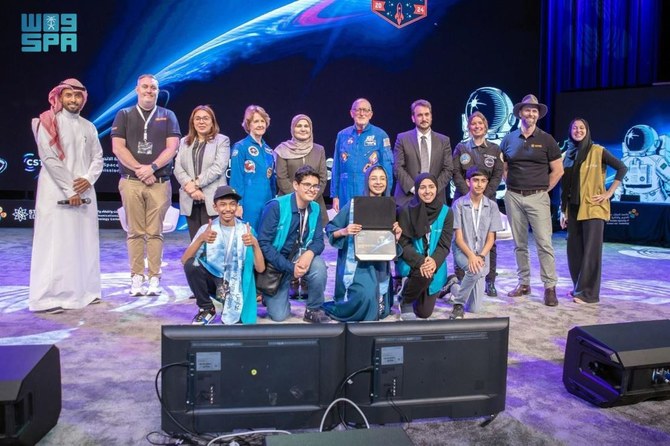
- Space 2102 program hosted 150 outstanding students, aged from 13 to 15, from various regions, in a five-day event
- Program included lectures, software training, and enrichment activities to guide and develop the students’ learning journey
RIYADH: King Abdullah University of Science and Technology is creating new opportunities for young people in Saudi Arabia by supporting research and innovation in science, technology, engineering, mathematics and space.
These efforts are part of the Space 2102 program, organized in partnership with the Communications, Space and Technology Commission and the Saudi Space Agency.
The program hosted 150 outstanding students, aged from 13 to 15, from various regions, in a five-day event, the Saudi Press Agency reported on Monday.
A team of international experts and KAUST faculty provided the students with training and education.
The Space 2102 program included lectures, software training, and enrichment activities to guide and develop the students’ learning journey.
Dr. Najah Ashry, vice president of the strategic national advancement division at KUAST, highlighted the success of the Space 2102 program, which aims to fulfill the dreams and aspirations of talented young Saudis in fields such as science, technology, and space.
KAUST’s early-onset enrichment activities help to engage the best young minds in the program, which improves the likelihood of science-based future leaders and entrepreneurs emerging and of a new era of leadership, research, and exploration in the Kingdom, the SPA reported.
The Space 2102 program concluded with a CubeSat challenge, where teams used technology to design and test their own missions. The focus was on using science and technology to address the conservation and rehabilitation of coral reefs in the Red Sea.
King Salman academy to host Arabic education forum in Seoul

- Scholars, teachers, linguistic experts will attend May 9 and 10
- Discussions on curricula, teaching methods and Arab culture
RIYADH: The King Salman Global Academy for Arabic Language is partnering with the Korean Association of Arabic Language and Literature and Hankuk University of Foreign Studies to host an international conference in Seoul, South Korea.
The conference, titled “Challenges and Prospects of Teaching Arabic Language and Literature,” is set for May 9 and 10, the Saudi Press Agency reported on Monday.
Participants will discuss key issues involving Arabic-language education globally and explore new approaches in response to evolving trends and needs.
The event will involve scholars, researchers and language experts; and will help promote Arab culture, the SPA reported.
The conference will focus six key areas related to teaching Arabic as a second language in Korea: modern methodologies, teaching materials, evaluation techniques, instructional strategies, and the current state of Arabic-language learning in Korea.
By bringing together experts and academics from Saudi Arabia, Korea and other regions, the conference is designed to assist Arabic-language teachers and non-native speakers.
The King Salman academy is also set to launch its upcoming international conference on computational linguistics.


